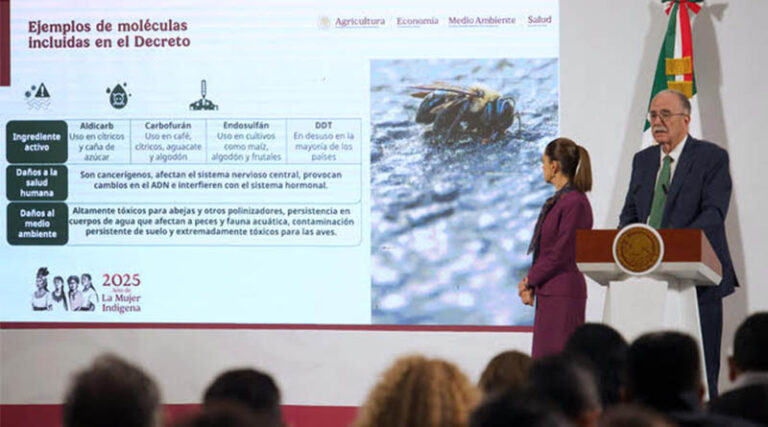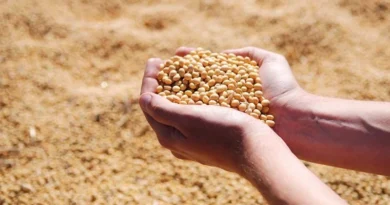
Mexico Bans 35 Highly Hazardous Pesticides, First Major Prohibition in 34 Years
06 September 2025, Mexico City: In a historic move, President Claudia Sheinbaum has signed a decree prohibiting the production, import, commercialization, and use of 35 pesticides across Mexico, citing severe risks to human health, biodiversity, natural resources, and ecosystems. This is the country’s most far-reaching pesticide prohibition in more than three decades.
The announcement was made through a joint statement by the Secretariats of Agriculture and Rural Development (AGRICULTURE), Health, Environment and Natural Resources (ENVIRONMENT), and Economy, which together evaluated the scientific evidence behind the decision. According to officials, such a large-scale prohibition has not been enacted since 1991, when Mexico banned 21 active ingredients.
Why the Ban Matters
Authorities highlighted that many of the banned substances are persistent organic pollutants that remain in soil and water, accumulate in human and animal tissues, and move through the food chain, ultimately causing long-term damage to health and the environment.
The decree is framed as part of a comprehensive national strategy aimed at protecting agricultural workers, improving public health, and steering Mexican agriculture toward sustainable practices. It also responds to the demands of civil society to reduce the risks associated with unsafe pesticide use.
“This action strengthens Mexico’s commitment to healthy food production, the preservation of natural resources, and the adoption of international best practices in agriculture,” the statement read.
List of Banned Pesticides
The 35 substances prohibited under the decree include:
2.4 DB, Alachlor, Aldicarb, Azafenidine, Azinphos-methyl, Azocyclotin, Bioresmethrin, Bromuconazole, Captafol, Carbofuran, Carbosulfan, Chlordane, Chlorpyrifos-methyl, DDT, Diclofop-methyl, Dinocap, Dinoseb, Disulfoton, Edifenfos, Endosulfan, Fenarimol, Fenitrothion, Fenthion, Fentoate, Flusilazol, Fosfamidon, Hexachlorocyclohexane, Hexaflumuron, Lindane, Metidathion, Fenbutatin oxide, Parathion ethyl, Quinalphos, Resmethrin, and Trichlorfon.
Many of these substances, such as DDT, Endosulfan, Carbofuran, and Lindane, have been linked globally to environmental contamination and chronic health issues.
Implementation and Enforcement
Once published in the Official Journal of the Federation (DOF), the decree will require the Federal Public Administration to revoke or deny any authorizations, permits, or registrations related to the banned pesticides. This applies to their production, formulation, storage, import, transport, marketing, distribution, application, and final disposal.
The government is also working closely with the phytosanitary protection industry and the scientific community to make safer pesticide alternatives accessible, particularly for small and medium-sized farmers. Officials noted that the objective is to balance Mexico’s food self-sufficiency goals with sustainable agricultural practices.
Alignment with International Commitments
The ban also reinforces Mexico’s adherence to binding global treaties, including the Stockholm Convention and the Rotterdam Convention, which aim to eliminate or restrict hazardous chemicals and protect human health from persistent organic pollutants.
By taking this step, Mexico joins a global trend of phasing out harmful agrochemicals in favor of practices that safeguard the environment, food quality, and rural communities.
Future Steps
Authorities confirmed that this is only the first phase of a broader national strategy. The ministries involved are already analyzing additional substances that may be prohibited in future decrees, signaling a progressive elimination of hazardous pesticides from Mexican agriculture.
“Mexico is moving decisively towards a more sustainable and responsible agricultural model, consistent with the standards of the Food and Agriculture Organization (FAO) and the **World Health Organization (WHO),” the joint statement emphasized.
Also Read: India Slashes GST on Tractors and Agri-Inputs to Boost Farm Economy
📢 If You’re in Agriculture, Make Sure the Right People Hear Your Story.
From product launches to strategic announcements, Global Agriculture offers unmatched visibility across international agri-business markets. Connect with us at pr@global-agriculture.com to explore editorial and advertising opportunities that reach the right audience, worldwide.






